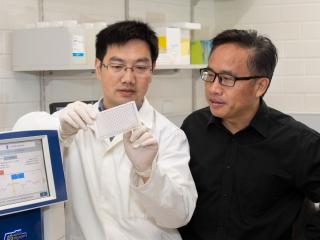A new test that more accurately determines the identity and purity of Australian barley seed is set to transform the industry from one end of the supply chain to the other.
The barley variety identification test, which uses DNA fingerprinting technology, was developed by Western Barley Genetics Alliance, a partnership between the Department of Primary Industries and Regional Development and Murdoch University.
Western Barley Genetics Alliance director Chengdao Li said the new molecular test would provide growers, plant breeders, grain handlers, seed companies, maltsters, marketers and customers with more confidence in the identity and purity of Australian barley varieties.
Professor Li said the test’s implementation would also lead to fast, accurate, low cost, high throughput seed identity and purity testing.
“Traditional testing methods that use protein profiles can have difficulty distinguishing between closely related varieties, like Scope and Buloke or Hindmarsh and La Trobe,” Professor Li said.
“This new technique draws from the Barley Genome Map, developed by an international consortium including the Western Barley Genetics Alliance, to correctly identify a variety down to the DNA level.
“The test takes less than two hours, compared with days or weeks for the traditional test, and costs less than $100 per sample.”
The new barley identity and purity test is now commercially available via the department’s Plant Laboratories.
Professor Li said the new test would generate greater certainty of variety identity throughout the Australian malting barley supply chain.
“Barley is traded as a variety-specific commodity on the international market, which requires more than 95 per cent varietal purity,” he said.
“Malting barley with lower seed purity can be downgraded to feed, potentially costing the grower $30-50 per tonne and damaging Australia’s reputation as a supplier of high quality grain.
“The new barley identity and purity test will assist seed companies and growers to supply the correct seed, grain handlers with variety segregations, while providing marketers, maltsters and other customers with more confidence in integrity of the Australian product.”
Professor Li said the new test would also help to ensure growers get what they pay for when purchasing seed.
“There was a recent case where a grower planted a crop of what he thought was Clearfield barley, which has herbicide tolerance, and lost the lot when it was sprayed as it turned out it was not the variety he thought it was,” he said.
“The department encourages all growers to have their barley seed tested before planting to avoid any costly mistakes and ensure they target the correct markets for their grain.”
Murdoch University Deputy Vice Chancellor Professor David Morrison said the new barley identification and purity test was a typical example of how the university and its partners worked to translate basic research into commercial applications.
“The development of the Barley Genome Map in 2017 is already starting to open doors to scientific applications, such as techniques like this, and new and improved varieties that will boost production and profitability,” Professor Morrison said.
“These gains are a terrific demonstration of how together, the department and university partners can apply advances in science to generate solutions that benefit individuals, communities and industries.”
DPIRD Grains Research, Development and Innovation director Kerry Regan said the Western Barley Genetics Alliance’s achievements epitomised the advances generated through scientific collaboration.
“The department is working closely on a range of projects with Murdoch University, the University of WA and Curtin University to address a myriad of cropping issues,” Ms Regan said.
“Through our network of staff across the agricultural region and productive working relationship with grower groups and industry, we all endeavour to advance grains production in WA to ensure our industry is competitive in the global marketplace.”
To enquire about a barley variety identification test contact DPIRD’s Diagnostics and Laboratory Services’ Seed Testing and Certification unit on +61 (0)8 9368 3721 or email ddls-stac@agric.wa.gov.au.

Media contacts:
Jodie Thomson/Megan Broad, media liaison
+61 (0)8 9368 3937
